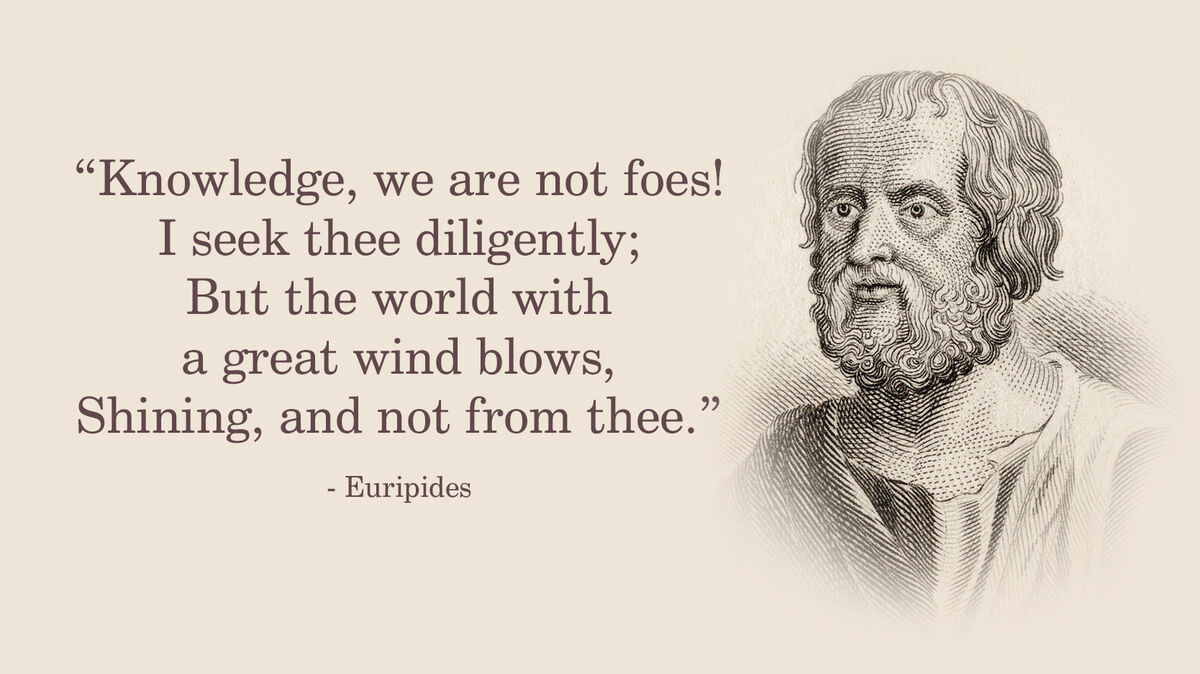
Euripides is often regarded as one of the fathers of Greek tragedy, along with Aeschylus and Sophocles. He wrote nearly one hundred dramas in his lifetime, many of which have survived over two thousand years, and created theatrical innovations that would pave the way for later writers, including William Shakespeare and Henrik Ibsen. His quotes resonate with readers who love the theater — and thrive on drama.
Euripides Quotes About Knowledge and Wisdom
Unlike his fellow ancient Greek thinkers, Euripides’ characters did not rely on knowledge and wisdom to navigate their circumstances. Instead, they tended to dismiss good advice, much to their (later) chagrin.
“Come unto fools with knowledge of new things / They deem it vanity, not knowledge.” - Medea
“And, to mine eyes, / Not in man's knowledge, not in wisdom, lies / The lack that makes for sorrow.” - Hippolytus
“What doth silence know / Of skill to stem the bitter flood of woe? / And human hearts in sorrow crave the more, / For knowledge, though the knowledge grieve them sore. / It is not love, to veil thy sorrows in / From one most near to thee, and more than kin.” - Hippolytus
“Wisdom is full of pity; and thereby / Men pay for too much wisdom with much pain.” - The Electra
“Knowledge, we are not foes! / I seek thee diligently; / But the world with a great wind blows, / Shining, and not from thee …” - Hippolytus
“That heritage sublime / Our sires have left us, wisdom old as time, / No word of man, how deep soe'er his thought / And won of subtlest toil, may bring to naught.” - The Bacchae
“And yet some Muse majestical, / Unknown, hath hold of woman's hand, / Seeking for Wisdom — not in all: / A feeble seed, a scattered band, / Thou yet shalt find in lonely places, / Not dead amongst us, nor our faces / Turned alway from the Muses' call.” - Madea
Euripides Quotes About Love
Many of Euripides’ characters fall head over heels in love, only to curse that love after something terrible happens. In the happier moments, however, love is quite grand.
“Old love burneth low / When new love wakes, men say.” - Medea
“A friend to share, not faltering from love, / Fair days and foul the same.” - Electra
“Oh, in all things but this, / I know how full of fears a woman is, / And faint at need, and shrinking from the light / Of battle: but once spoil her of her right / In man's love, and there moves, I warn thee well, / No bloodier spirit between heaven and hell.” - Medea
“Dire and beyond all healing is the hate / When hearts that loved are turned to enmity.” - Medea
“When the flow / Of love runs plain, why, all the world is fair: / But, once there fall some ill chance anywhere / To baulk that thirst, down in swift hate are trod / Men's dearest aims and noblest.” - Medea
“Alas, the Love that falleth like a flood, / Strong-winged and transitory: / Why praise ye him? What beareth he of good / To man, or glory?” - Medea
Euripides Quotes on Heartbreak and Sorrow
Euripides wouldn’t be the master of tragedy if he didn’t cause his characters grief. They often lament their circumstances, their pasts, and inevitably, each other.
“I come in sorrow for thy sorrow, son. / A faithful wife indeed thou hast lost, and one / Who ruled her heart. But, howso hard they be, / We needs must bear these griefs.” - Alcestis
“God shelter me from prosperous days of pain, / And wealth that maketh wounds about my heart.” - Medea
“And who hath said that Love shall bring / More joy to man than fear and strife?” - Alcestis
“Blessed are they who dare to dwell / Unloved of woman! 'Tis but one / Heart that they bleed with, and alone / Can bear their one life's burden well.” - Alcestis
“Hast thou lived all these years, and learned but now / That every man more loveth his own head / Than other men's?” - Medea
“Oft have I seen, in other days than these, / How a dark temper maketh maladies / No friend can heal.” - Medea
“Ah, but the man—cursèd be he, / Cursèd beyond recover, / Who openeth, shattering, seal by seal, / A friend's clean heart, then turns his heel, / Deaf unto love: never in me / Friend shall he know nor lover.” - Medea
A Flair for Drama
Euripides may have been the first to put his characters through the wringer of humanity, but he certainly wouldn’t be the last. For more examples of tragedy and Greek theatrical devices, check out: